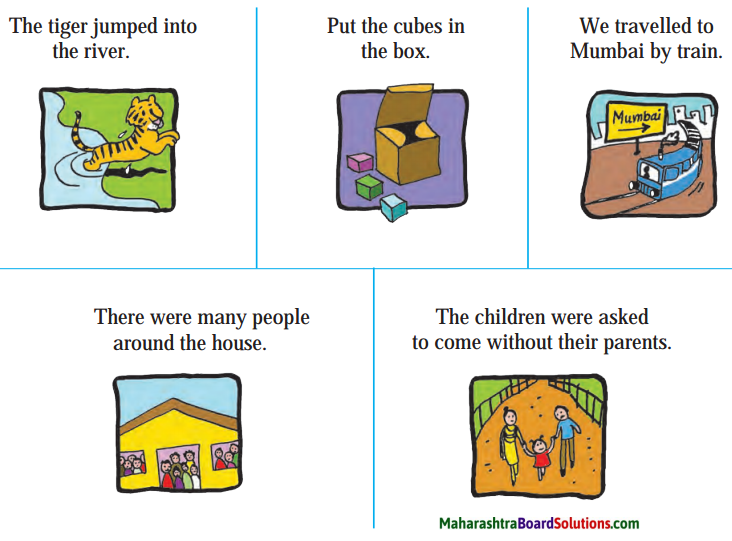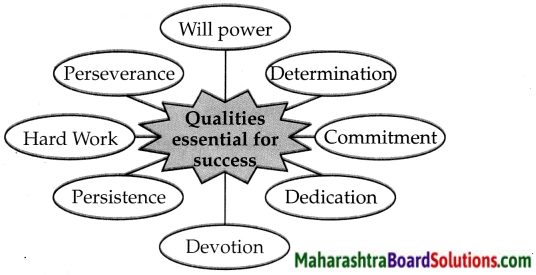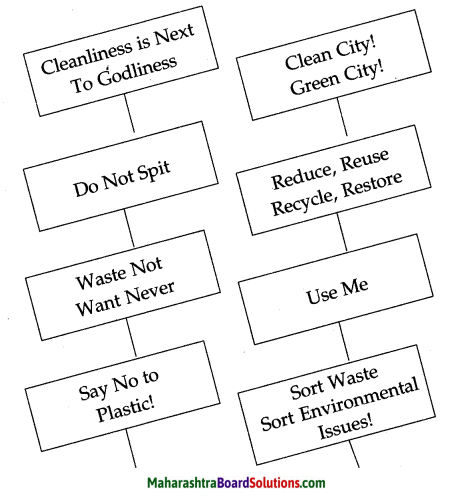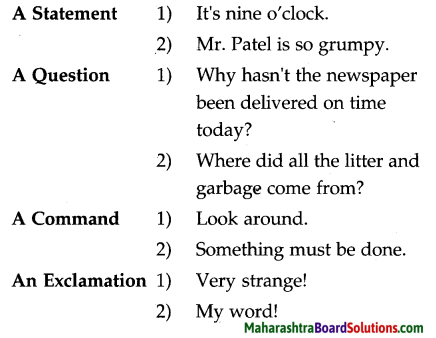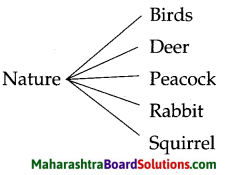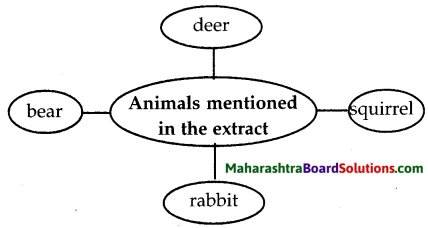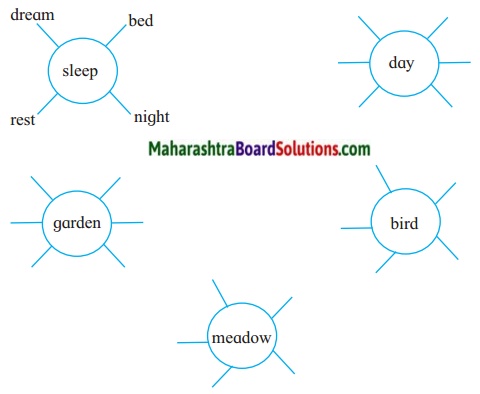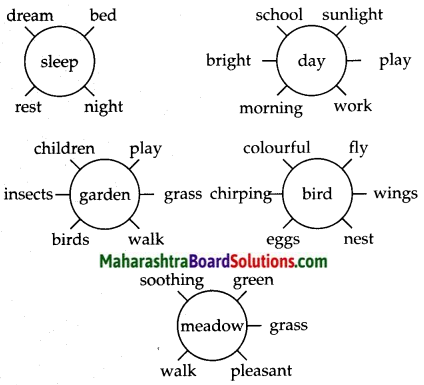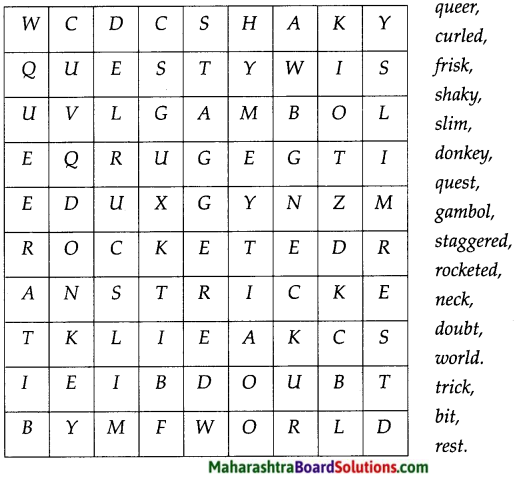Balbharti Maharashtra State Board Class 6 English Solutions Chapter 1.7 Param Vir Chakra: Our Heroes Notes, Textbook Exercise Important Questions and Answers.
Std 6 English Lesson 1.7 Param Vir Chakra: Our Heroes Question Answer Maharashtra Board
Class 6 English Chapter 1.7 Param Vir Chakra: Our Heroes Textbook Questions and Answers
1. Read the passage and answer the following questions:
Question a.
What is ‘Param Vir Chakra’?
Answer:
Param Vir Chakra is India’s highest military decoration awarded for the most conspicuous bravery of some daring or pre-eminent act of valour or self-sacrifice by our brave soilders, in the presence of the enemy, whether on land, at sea, or in the air.
Question b.
What is seen on the obverse and reverse of the PVC medal?
Answer:
On the obverse, it has the Indian National Emblem at the centre, surrounded by four replicas of ‘Indra’s Vajra’. On the reverse, the words Param Vir Chakra are engraved in Hindi and English with two lotus flowers in between them.
![]()
Question c.
Who designed the PVC medal?
Answer:
The Param Vir Chakra medal was designed by Savitribai Khanolkar.
Question d.
What makes Indra’s Vajra or thunderbolt invincible?
Answer:
The Indra’s Vajra or thunderbolt was fashioned from the bones of Sage Dadhichi, and the supreme sacrifice of the Sage makes the weapon invincible.
2. Write the story of Sage Dadhichi’s sacrifice in your own words.
Question 1.
Write the story of Sage Dadhichi’s sacrifice in your own words.
Answer:
Many, many years ago, a demon set out on a mission: stealing all the water in the world! The consequence was very serious. Innocent people suffered and lost their lives. They had no water to quench their thirst. Defeating this demon with an ordinary weapon was not possible.
An extraordinary weapon was required. Sage Dadhichi whose bone had extraordinary power was the only person who could save the people from the clutches of the demon. But how could anyone ask a man for his bones?
A noble man that Sage Dadhichi was, he himself sacrificed his life and gave his own bones to help the people. Using the bones of Sage Dadhichi, Indra’s weapon of thunderbolt was designed, and this matchless weapon helped Indra to defeat the demon. Through Sage Dadhichi’s sacrifice, we learn the value of selflessness and the significance of sacrificing our own life for the larger good.
![]()
3. Read aloud the account of how Flying Officer Nirmal iii Singh Sekhon sacrificed his life lo defend our country.
Question 1.
Read aloud the account of how Flying Officer Nirmal iii Singh Sekhon sacrificed his life lo defend our country.
Answer:
- Sending them sweets on festive occasions.
- Collecting funds and contributing it towards various initiatives organised by soldiers.
- Visiting them and organising cultural programmes for them.
- Writing letters to them and expressing our gratitude to them for giving us a sense of security.
- Inviting them to the school on occasions like Independence Day, Republic Day etc., and deriving inspiration from their words of wisdom.
4. Find more information about other Param Vir Chakra awardees. Prepare a collage using photographs, pictures and text matter written In beautiful handwriting.
Question 1.
Find more information about other Param Vir Chakra awardees. Prepare a collage using photographs, pictures and text matter written In beautiful handwriting.
5. Find more information about the Indian Armed Forces: The Army, the Navy and the Air Force.
Question 1.
Find more information about the Indian Armed Forces: The Army, the Navy and the Air Force.
Answer:
The Indian Armed Forces: the Army, the Navy and the Air Force are the military forces of our country. They are supported by paramilitary organisations.
Indian Air Force is the air arm of the IAF. The highest rank is Air Marshal.
Indian Army is the land based branch commanded by a 4 star General or the Chief of Army Staff.
Indian Navy is the naval branch. The chief of Naval staff is a 4 star officer in the rank of Admiral.
Rank of Air Force Officers
Marshal → Air Chief Marshal
Air Vice – Marshal → Air Commodore
Group Captain → Wing Commander
Squadron Leader → Flight Lieutenent Flying Officer
![]()
6. What can you do to show your love, respect and support to the soldiers who fight for the country? Discuss this in the classroom. For example, you can send greeting cards to them on various occasions, with the help of your teacher.
Sometimes, we use two or three adjectives together to describe a noun. In such cases, the order in which adjectives are used depends on the meaning. The adjectives that express/show your opinion about something are usually put first. The other adjectives are normally put in the following order:
size, age, shape, colour, origin, material, use or purpose.
Examples:
- a nice little basket
- a brave young woman.
- a big red, plastic bag.
- a noisy, old, drilling machine
Class 6 English Chapter 1.7 Param Vir Chakra: Our Heroes Additional Important Questions and Answers
Answer the following questions in one or two sentences.
Question 1.
How are the brave deeds of our brave soldiers honoured?
Answer:
The brave deeds of our brave soldiers are honoured by bestowing military decorations on them.
Question 2.
Which is India’s highest military decorations?
Answer:
The Param Vir Chakra is India’s highest military decoration.
![]()
Question 3.
Why is the Param Vir Chakra awarded?
Answer:
The Param Vir Chakra is awarded for the most conspicuous bravery or some daring or pre-eminent act of valour or self-sacrifice, in the presence of the enemy, whether on land, at sea or in the air.
Question 4.
Where does the Indian Military derive its inspiration from?
Answer:
The Indian Military derives its strength and inspiration from the sacrifice of the bravest of the brave – The Param Vir Chakra holders.
Complete the fact file on: The Param Vir Chakra
- Name of the : The Param Vir Chakra medal
- Name of the : Savitribai Khanolkar designer:
- Description : Made of bronze, fitted with swivel mounting and has a plain purple ribbon.
- Obverse of the : Has the Indian National PVC medal Emblem at the centre surrounded by four replicas of iridra’s Vajra.’
- Reverse of the : The words ‘Param Vir PVC Medal Chakra’ are engraved in Hindi and English, with two lotus flowers between them.
![]()
Reading Skills, Grammar and Vocabulary
Read the following extract and complete the activities that follow.
Pre-reading Activity
Question 1.
Complete the following web diagram.
Answer:
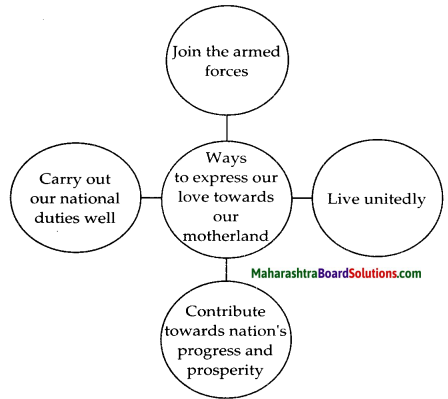
Question 2.
Which martyr is paid tribute to in this extract?
Answer:
Flying Officer Nirmal Jit Singh Sekhon is the martyr who is paid tribute to in this extract.
![]()
Question 3.
What happened on the 14th of December, 1971?
Answer:
On the 14th of December, 1971, Srinagar Airfield was attacked by a wave of six enemy Sabre aircraft.
Question 4.
What problem did Flying Officer Nirmal Jit Singh Sekhon encounter?
Answer:
Flying Officer Nirmal Jit Singh Sekhon who was on readiness duty could not take off immediately because of the clouds of dust raised by another aircraft.
Question 5.
Give a brief account of the act of valour displayed by Flying Officer Nirmal Jit Singh Sekhon.
Answer:
Flying Officer Nirmal Jit Singh Sekhon took off in his Gnat fighter the moment he could. He began to combat the powerful Sabre jet aircraft of the enemy. He damaged two of them. His fight with the attacking aircraft then continued at tree-top height. At last, the enemy aircraft fled from the scene of battle. The airfield and the town of Srinagar were saved.
Question 6.
How did Flying Officer Sekhon lose his life?
Answer:
Even though Flying Officer Sekhon succeeded in forcing the enemy aircraft to retreat, and the airfield and town of Srinagar were saved, unfortunately Flying Officer Skehon’s aircraft too crashed, and he lost his life.
Question 7.
Which qualities did Flying Officer Sekhon display?
Answer:
Flying Officer Sekhon displayed great flying skill and determination in the face of certain death. He also showed unmatched heroism above and beyond the call of duty.
![]()
Question 8.
He damaged two of them. (Change the voice.)
Answer:
Two of them were damaged by him.
Question 9.
Circle the odd word: plain purple ribbon (power)
Answer:
power
Question 10.
How has the account of bravery displayed by Flying Officer Nirmal Jit Singh Sekhon inspired you? Write in detail.
Answer:
The bravery displayed by Flying Officer Nirmal Jit Singh Sekhon has inspired me to give my best for my nation’s safety and security. It has aroused the value of patriotism in me and I am also willing to make the highest sacrifice for my motherland.
Language Study
Do as directed.
Question 1.
Their brave deeds are honoured by bestowing military decorations on them. (Pick out the adjectives.)
Answer:
Adjectives – brave, military
![]()
Question 2.
Param Vir Chakra is India’s highest military decoration. (Change the degree of comparison.)
Answer:
No other military decoration in India is as high as Param Vir Chakra.
Question 3.
The Param Vir Chakra is a very rare honour. (Make it exclamatory.)
Answer:
What a rare honour the Param Vir Chakra is!
![]()
Question 4.
Fourteen of these awards were given posthumously. (Pick out the adverb.)
Answer:
Adverb – posthumously
Question 5.
Something extraordinary was required. (Form a Wh-question to get the underlined part as the answer.)
Answer:
What was required?
Question 6.
Innocent people were suffering and dying without water. (Use not only… but also.)
Answer:
Innocent people were not only suffering but also dying without water.
Question 7.
Sage Dadhichi was a noble person. (Make it Interrogative).
Answer:
Wasn’t Sage Dadhichi a noble person?
![]()
Question 8.
The airfield and the town of Srinagar were saved. (Separate the Subject and Predicate.)
Answer:
Subject: The airfield and the town of Srinagar Predicate: were saved.
Question 9.
The medal itself is very simple in appearance. (Pick out the naming word.)
Answer:
Naming word – medal
Question 10.
Savitribai loved India and took Indian citizenship. (Pick out two proper nouns.)
Answer:
Savitribai, India
Give the antonyms of:
- past × present
- presence × absence
- strength × weakness
- clear × unclear
- powerful × weak
- certain × uncertain
Make sentences using the following phrases.
- to take off: The flight took off before he arrived at the airport.
- to attack: The enemy attacked the kingdom and took everyone by surprise.
- to show unmatched heroism: The soldier displayed unmatched heroism before sacrificing his life for his motherland.
![]()
Use two or three adjectives together to describe a noun.
Answer:
- A sweet, little girl.
- A courageous, brave soldier.
- A fragrant, red rose.
- A long, pink gown.
- A small, green parrot.
- An old, pleasant, cheerful man.
- A kind, compassionate, helpful lady.
Do you know!
- The President of India is the Supreme Commander of the Indian Armed Forces.
- The Indian Armed Forces are managed by the Ministry of Defence, the Government of India.
- More than 1.3 million personnel are working in the Indian Armed Forces.
- The Indian Armed Forces have been engaged in various military operations.
- December 7 is observed as Armed Forces Flag Day
Param Vir Chakra: Our Heroes Summary in English
The author begins by narrating the sacrifice of Sage Dadhichi who laid down his life and gave his own bones for the larger good. He did this to help the people from a demon who had stolen all the water in the world. Indra’s Vajra – Indra’s weapon of thunderbolt was fashioned from Sage Dadhichi’s bones and the demon was defeated.
According to him, just as Indra’s Vajra derived power from sage Dadhichi’s bones, the Indian military derives its strength and power from the sacrifice of the bravest of the brave – the Param Vir Chakra holders.
The lesson goes on to describe the Param Vir Chakra medal. It also provides us a list of 21 bravest of the brave i.e., Param Vir. The lesson also provides information about the bravery and sacrifice made by selfless patriot Nirmal Jit Singh Sekhon, a Param Vir. Nirmal Jit Singh Sekhon sacrificed his life to save an airfield and town of Srinagar from the enemy. Let us derive inspiration from our brave, selfless soldiers and be willing to make the final sacrifice for our country, our motherland, India.
![]()
Introduction:
We live in our country with a sense of security because our brave soldiers, even at the cost of their lives are guarding us with their presence on land, at sea or in the air. Their extraordinary acts of bravery are recognised by bestowing military decorations on them. The highest military decoration is the Param Vir Chakra. This lesson tells us more about Param Vir Chakra.
Glossary:
- legendary (adj) – very famous and admired
- extraordinary (adj) – very special
- bestowing (v) – presenting
- military (n) – soldiers of all armed forces
- conspicuous (adj) – outstanding, easily attracting attention
- pre-eminent (adj) – outstanding
- valour (n) – bravery
- self-sacrifice (n) – giving up one’s life for a cause
- posthumously (adv) – after a person’s death
- matchless (adj) – something which cannot be equaled
- invincible (adj) – unconquerable
- noble (adj) – morally good
- thunderbolts (n) – a flash of lightning with a clap of thunder that strikes at something
- derives (v) – obtains
- inspiring (v) – motivating
- aircraft (n) – a machine used to fly in air
6th Std English Balbharati Textbook Solutions
- Don’t Give Up! Class 6 Question Answers
- Who’s the Greatest? Class 6 Question Answers
- Autobiography of a Great Indian Bustard Class 6 Question Answers
- Children are Going to School … Class 6 Question Answers
- A Kabaddi Match Class 6 Question Answers
- The Peacock and the Crane Class 6 Question Answers
- Param Vir Chakra: Our Heroes Class 6 Question Answers
